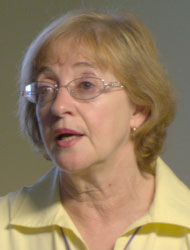By Alexandra De Filippo
MIAMI - I thought I knew a lot about the serious problems with water around the world – the shortages, the pollution, the impact on cities and villages. After all, we have been hearing for some time that if the wars of the 20th centuries were fought over oil, those of the 21st century would be fought over water. Even so, I was caught off guard as I read Blue Covenant: The Global Water Crisis and the Coming Battle for the Right to Water, Maude Barlow’s latest book. The book, the 16th she has written on the environment, development and politics underscored for me the immediacy and magnitude of the global water crisis and the nature of the debate surrounding the ownership of water.
Maude Barlow
According to Barlow, we are depleting our underground reserves of water and draining off rivers like the Colorado and the Nile at such a pace that they may never recover. She says that 80% of China’s rivers and 75% of those in India have become running sewers. The consequences of pollution are grim. Half the world’s hospital beds, she says, are filled with victims of waterborne diseases.
Blue Covenant has been published at a time when some experts say that the condition of the world’s water has reached a critical point. I found it hard to imagine that the situation described by Barlow referred to the current state of the planet as opposed to some futuristic film. But she cites data from several organizations, including the United Nations, to back up her contentions. Some parts of the world, like the Middle East, sections of Africa and Asia and the middle of the United States are already running low on clean, fresh water, the United Nations says. And the world agency estimates that two-thirds of the world population will be confronting water shortages in less than 20 years – unless we change our ways.
In Blue Covenant, Ms. Barlow has crafted a detailed and compelling account of what she describes as the “three water crises”—diminishing freshwater supplies, inequitable access to water and businesses finding ways to make money off water. Her objective is to make readers question old practices and to take what she regards as the necessary action to deal with these issues. In her words, “the answer to the world’s water crisis rests on the principles of conservation, water justice and democracy.” She wants people to use water more consciously, to consume tap water when possible, and to press governments to stop the privatization of water.
Ms. Barlow heads the Council of Canadians, an advocacy group in Canada dealing with the environment, health and trade issues. She is also the co-founder of the Blue Planet Project, which strives to bring together people around the world who are working to raise awareness of water problems and who contend that water is a public trust and a basic human right.
In Blue Covenant, she recounts her experiences around the world with ordinary people along rivers and lakes and at conferences in places like the Hague, Kyoto and Mexico City. Part of Ms. Barlow’s story is the tale of water hunters vs. water warriors. By water hunters she means corporate giants, from utility companies to companies that have expanded from bottling soft drinks to bottling water. She also includes brokers who trade in water property rights around the world.
Though the companies contend that they are helping to conserve water, Ms. Barlow argues that the profit motive dominates and undermines conservation efforts. And water has become very profitable. Indeed, she says, over the five years ending in 2007, publicly traded companies dealing in water outperformed the cross section of American companies that make ups the Standard & Poors 500 by 260 percent.
Ms. Barlow describes her water warriors as members of “a global citizens’ movement” that she says “has challenged the growing political influence of transnational organizations in every sphere of life.” She also says they have forced governments in several countries to acknowledge the right of people to water and to break ties with private water utilities.
I grew up in the city of Barquisimeto in west central Venezuela, halfway between Caracas and Maracaibo on the Turbio River. My family paid a private company to truck drinking water to our house and bought bottled water in grocery stores and from vending machines just about everywhere we went. I took water for granted. But Blue Covenant made me think about my own habits and whether water should be considered a commodity, a product that can be owned and commercialized, or a basic human right. There is no question where Ms. Barlow stands. For her, access to clean, fresh water is a fundamental right of everyone of us, no matter how poor, no matter how isolated.

